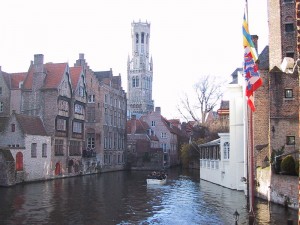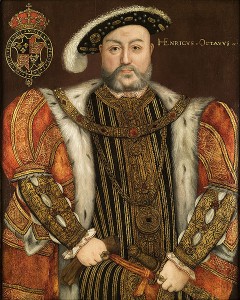2.2- Influences on the Northern Renaissance
Humanism in the Northern Renaissance
Two Giant Scholars
Desiderius Erasmus (1466-1536) (more information)
[audio:Erasmus.mp3]- Humanist scholar and priest
- Deeply spiritual and well traveled
- Two important works: Familiar Conversations (1519) and The Praise of Folly
Familiar Conversations
- A satiric attack on the abuses within the Catholic Church
- His goal was to internally reform of the Catholic Church
- He was not in favor of the creation of Protestant Churches
In Praise of Folly
- A satire of the hypocrisy and pretensions that prevailed during his time
Sir Thomas More (1478-1535) (more information)
[audio:More.mp3]- Humanist scholar and friend of Erasmus
- Wrote Utopia
- A man of principle, he was executed because he could not in good conscious fully pledge his allegiance to King Henry VIII’s Church of England
Michel de Montaigne (1533-92)
“I have never seen a greater monster or miracle than myself.’ – Essays
https://oregonstate.edu/instruct/phl302/philosophers/montaigne.html
Read a chapter from Essays
https://oregonstate.edu/instruct/phl302/texts/montaigne/m-essays_contents.html
Politics
The Hapsburgs –
[audio:TheHapsburgs.mp3]Article: How the Hapsburgs Shaped Our Arts
Bruge
https://www.youtube.com/watch?v=SXfRTxaqi4Q
[audio:Bruge2.mp3]King Henry
[audio:KingHenry.mp3]Religion -The Protestant Reformation
Martin Luther — 1483-1546 (more information)
[audio:MartinLuther.mp3]One of the most important figures of the 1500’s
Monk and scholar — professor at Wittenburg University
Famous disputation — Ninety-five Theses
Luther’s Legacy
- Ninety-five These was an attack primarily aimed at the practice of “indulgences.’
- Indulgences — a way to pay priests for your salvation
- God’s gift — the printing press
- Separate Protestant churches formed
- Luther was not an iconoclast
- He was an art lover and composed hymns
John Calvin 1509-64 (more information)
[audio:JohnCalvin.mp3]- Take away distractions from spirituality
- Linked to Puritanism and America
The Basis for the Creation of Protestant Churches
[audio:BasisforProtestantChurches.mp3]- If you disagreed with the church, you were kicked out — excommunicated
- The opulence and worldly wealth and pursuits of the Catholic Church
- The principle that faith needed to be combined with deeds for salvation
- The power, ritual and dogma associated with the Papacy
- The desire to focus on the essentials of Christianity — which had consequences for the arts.
Science & Technology
Exploration, Economics and the Arts
The Natural resource of the Americas and Caribbean
[audio:Neweconomics.mp3]- The new staples for Europe – Cocoa, sugar, cotton, tobacco
- Explosion of the Merchant Class – More wealth amongst more people was good for the arts
Astronomy and The Scientific Method
[audio:astronomyandscientificmethod.mp3]
Nicolas Copernicus — 1473-1543
- On the Revolutions of Celestial Bodies
- An argument that the earth and planets orbited the sun
Francis Bacon — 1562-1626
The “Scientific Method’
- Printing of Plays and poetry
- Multiple copies of art works, such as engravings
Architecture
The Evolution of the Castle
[audio:evolutionofcastles.mp3]Examples from France
Examples from England





 |
|
No. 1 — September 17th, 2009 at 4:13 pm
does anyone else have the intense longing to go to Europe and spend DAYS exploring the castles and art?!
No. 2 — September 18th, 2009 at 2:19 pm
I thought it was interesting that science was so much a part of the Northern Renaissance when the church was still so much in control.
No. 3 — September 18th, 2009 at 8:50 pm
Luther’s Legacy sound clip is missing 🙁
No. 4 — October 11th, 2009 at 2:50 pm
Francis Bacon and Nicolas Copernicus explains that science has an importance in Northern Renaissance times Astronomy and The Scientific Method.
No. 5 — September 18th, 2012 at 7:36 pm
I admire that the greater freedom found in the artistic expression of the Renaissance found its way into the sciences and into the everyday experiences of the populace. The more people learned, the more they wanted to learn. The small inroads into freedom of expression led to the advancement of western civilization!
No. 6 — September 27th, 2013 at 11:49 pm
We absolutely love your blog and find the majority of your post’s to be precisely what I’m looking for.
Do you offer guest writers to write content for yourself?
I wouldn’t mind publishing a post or elaborating on some of the subjects you write regarding here.
Again, awesome website!
No. 7 — September 30th, 2013 at 2:47 pm
Thanks for your positive response. This is a text for a University course. No guests at this point.